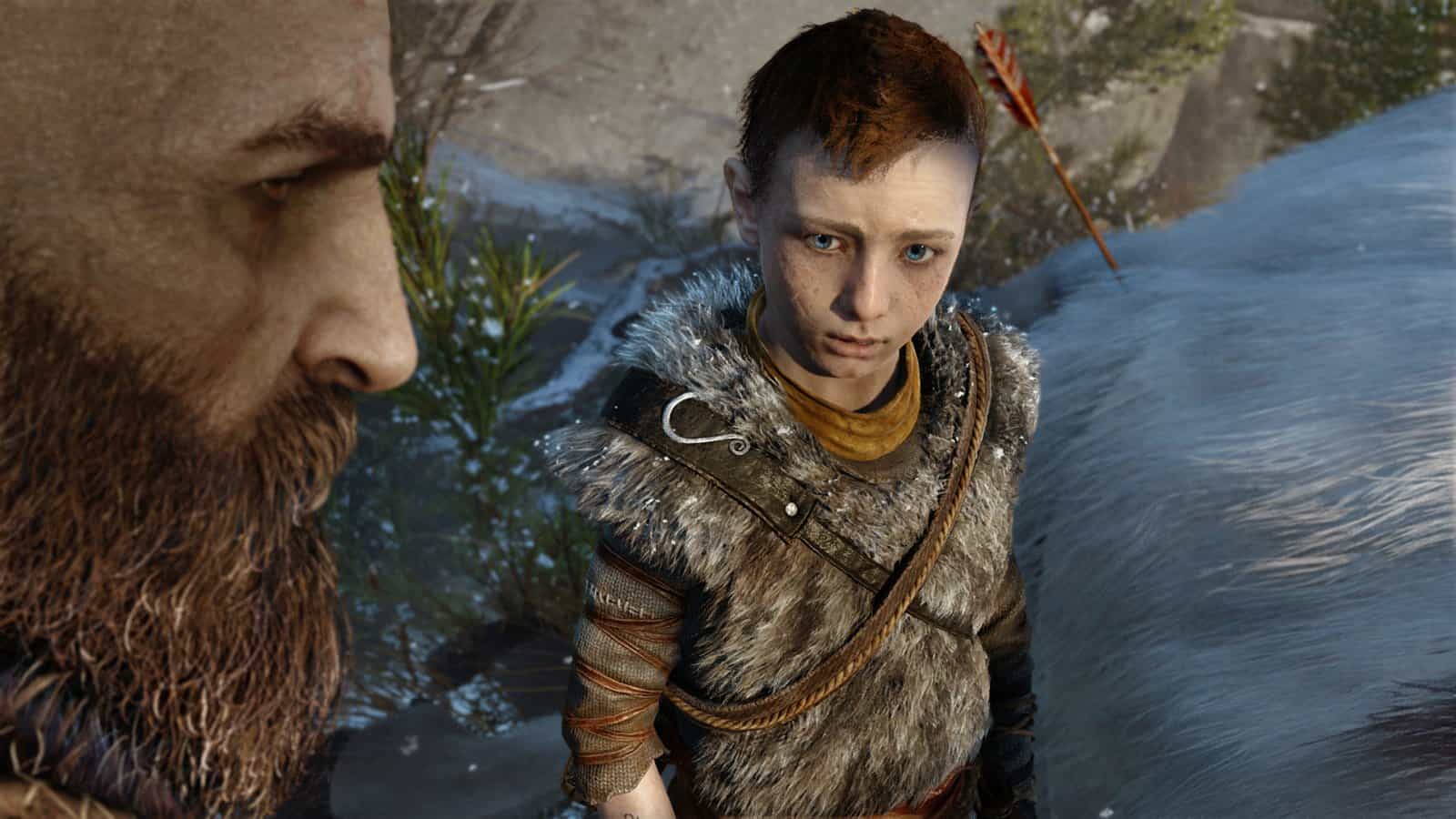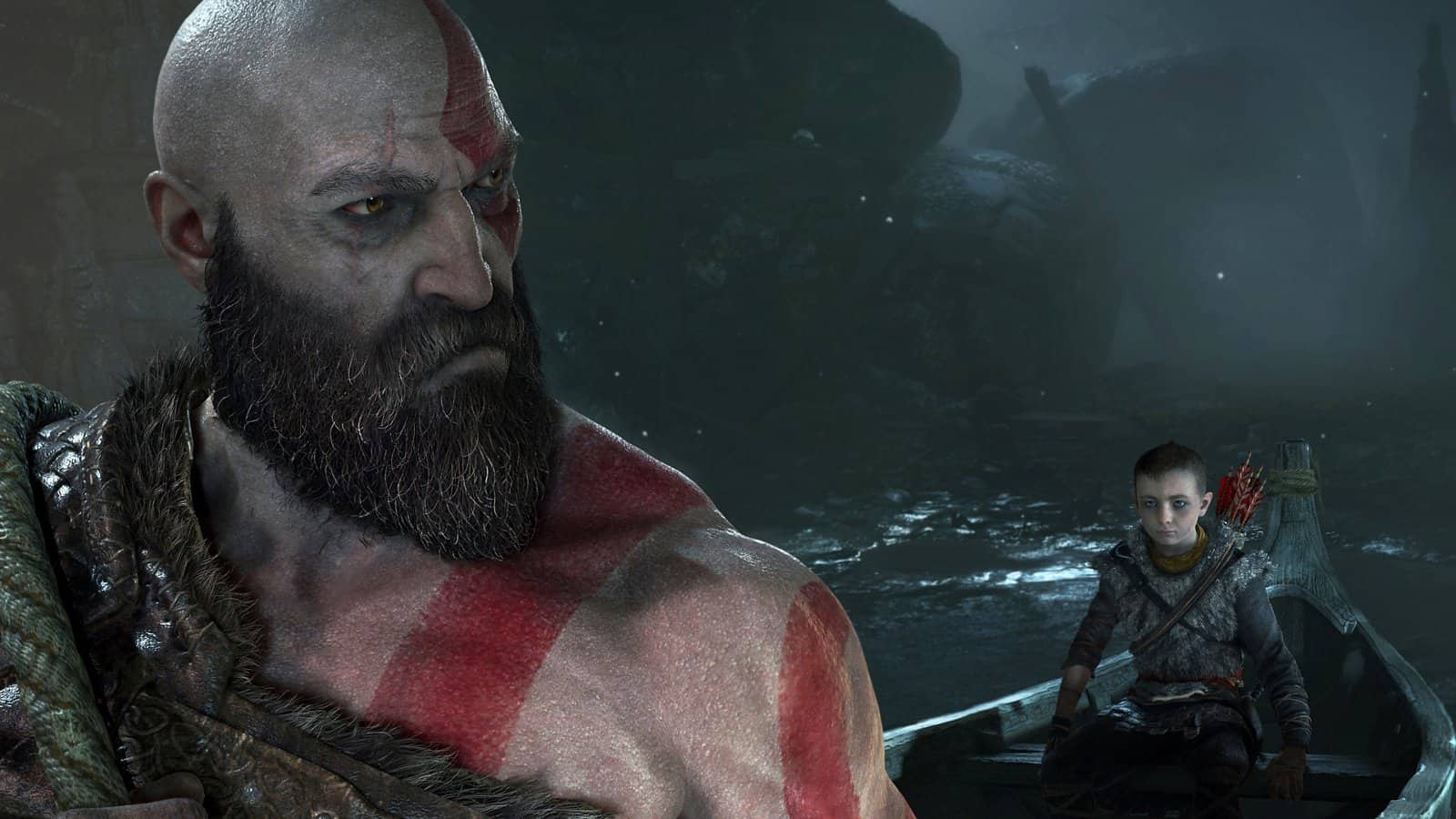Video Gamer is reader-supported. When you buy through links on our site, we may earn an affiliate commission. Prices subject to change. Learn more
The first thing you see, in God of War, is its hero, Kratos, all scowls and skin like cement, standing by a tree. The goatee of his younger days has given way to a forest of beard, jangled with rime, and there is something grave in his features—not only serious but death-filled, and buried deep. Moments later, he brandishes an axe and fells the tree. This tells us two things. One, that he is fixed upon a fairy tale task, given that the trunk bore the luminous yellow palm print of his late wife, Faye. And, two, that he is keen to cut down the past, hacking through its roots even as they writhe through the cold soil of the present.
And what is the present? We find Kratos kissed not by Greek sunshine—as he was in previous games—but by cruel Nordic winds. The creak of his spirit matches that of his new leather armour, but to make up for it he is also fitted with a sprightly son, Atreus, who likes to talk. Though, it must be said, his attempts at conversing with his father resemble someone trying to chisel open the ice-encrusted jamb of a freezer drawer in the hope of finding something warm. Their best chats occur on a boat, as Kratos plashes them onward, and they take the form of fables. “There was… a horse,” Kratos says, wrapping the beastly story of his own life in a hide of abstraction. “The horse sought vengeance upon his enemy.” Over the hours, the pair grow closer, meet a witch, kill a couple of gods, befriend a snake long enough to girdle the globe, and, finally, from a wuthering peak, cast Faye’s ashes onto the air.
God of War, which was developed by Santa Monica Studio and first released in 2018, on the PlayStation 4, is now on PC. Thus, a fresh swathe of players have a chance to stride forth and bask in its climate of steamed breath and wine-dark gore. Furthermore, compared to those who played the game when it first came out, they can do three times the basking; the game unreels, provided your PC has been sufficiently annealed, at ninety frames-per-second. Whether this is necessarily an improvement, or if it melts some of the cinematic frost that glitters at lower frame rates, is for every player to determine. Either way God of War has the faint smell of documentary; the camera, which sticks close to Kratos’s back, is imbued with a subtle heave and yaw, as though it were mounted onto the prow of a pursuant ship.
IO Interactive wielded a similar technique, in Kane & Lynch 2: Dog Days, wherein another bearded and unreachable male was hounded by a blood-drunk camera. His mission took place in an infernal Shanghai, flared with neon, and IO threw in other techniques to further spike the hell-brew: handheld shakes, clouds of pixelation, and a spray of rainy colour on the lens. The director of God of War, Cory Barlog, doesn’t go that far; the chief tactic employed is that of the one-shot—the illusion that the adventure unfolds in a single, unbroken take. The reason for this, I would guess, is, on the one hand, to keep our focus pinned to the central pair; and, on the other, to whet the edge of a quest which is, on paper, quite dull. When your heroes, mired in the dog days of Norse myth, are heading down a path already hairily trudged by Frodo Baggins, you need any urgency you can get.
The problem isn’t quite that the technique didn’t succeed, rather that it didn’t need to. Aside from the accepted rituals—trips to the pause menu, the enveloping darkness that accompanies one’s death—most games, in the thick of play, are already one-shot works. Removing cuts from the cutscenes does little to add to the basic feeling that we have been through one damned thing after another. The game to which God of War is stylistically in debt is Resident Evil 4, whose hero was similarly hugged by the camera from start to close. He, too, fought his way through a foreign land, under a sky the hue of old newspaper; and you sensed that he, like Kratos, had begun this particular journey long before we had joined him, and that his previous adventures were old news. Indeed, the most important cut in God of War is the one at the beginning, as we go from a black screen to the blue-white morning on which the game begins.
Whatever happened to Kratos between the old games and the new, as his odyssey and his personality were cooled and Edda-fied by Faye, we can’t be sure. (It isn’t likely that the process entailed him cradling a flat white and unloading the froth of his neuroses on a patient professional.) We also don’t require the information. When William Munny, the retired killer of Unforgiven, said that his wife “cured me of drink and wickedness,” we imagined what that might have entailed—the fever of his deeds sponged away like a cold sweat, over the course of years—and his presence in the here and now was shaded by that imagining. In God of War, Kratos, unlike Munny, is being softly rebooted; he arrives with questionable gaps in his C.V., but only those familiar with his previous employment—which consisted largely of public-sector deicide—would actually care to raise the questions.
General opinion on the game is that it marked the sudden bolting-on of complexity to a formerly shallow, humour-deficient loudmouth. Certainly, the actor who voiced Kratos in previous games, Terrence C. Carson, could not be accused of underplaying the role; even in calmer moments Kratos spoke at a low-end bellow, as though he had dined on a megaphone and it had lodged in his throat. But to accuse him of lacking complexity strikes me as unfair. Witness the scene, in God of War: Chains of Olympus (also co-written by Barlog), in which he is forced to push away the ghost of his daughter, Calliope, as she pleads with him to stay with her in the pain-free pastures of Elysium. Christopher Judge took over the role (Carson was deemed too slight of stature for the motion capture; “I move like a small guy,” he said in an interview) and his contribution was a deepening less of the character than of his larynx. Judge has a wondrous voice, like hardening magma, and in his cavernous vowels—“boy!”—you catch a hint of the hollowed-out. “Do not mistake my silence for lack of grief!” he says, cautioning Atreus—and us—of the danger in our habit of filling in what we presume to be empty space.
That, in the end, is the triumph of God of War. Though its hero arrives bearing newly concocted baggage, it leaves much of his troubles unsaid, and starts to put the squeeze on him. Hence the drawing in of the camera, after having it rove at a lofty distance for so long, like a wheeling vulture. After years of Olympus, now we get the chains. The result is as much a reflection on the past as it is on the present—not the addition of depth but the framing of it. Santa Monica Studio pulls off a similar feat to that of James Mangold, who made Logan. It was that film’s conceit that its protagonist, an age-resistant mutant with metal-plated bones, was riven by equal parts rust and regret. Mangold’s movie also leant on an uncertain history; it allowed the fog of time to seep into the franchise—did the other films, through which Logan had leapt and slashed, really happen, and how did he get here?
If your first experience of the series came in 2018, or if it comes now, on PC, rest assured: you don’t need all the answers. You will feel the weight of past games regardless. Personally, I don’t consider God of War the best in its series. I prefer the comic-adventurous mood of its predecessors, with Kratos galloping through Greece in his vexed prime, fuelled by drink and wickedness. Still, there is much to relish now, in his wearier years. His glories may have faded, but we are forbidden to look away.



